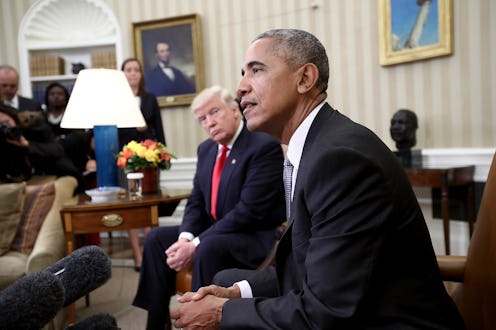News
Trump Is Blaming School Shootings On An Anti-Discrimination Obama Policy Now

As part of his new effort to focus on school safety in response to the mass shooting at Marjory Stoneman Douglas High School, President Trump has returned to an old punching bag: his predecessor. Trump's school safety commission will investigate an Obama policy originally meant to help minority students avoid disciplinary discrimination. The policy, despite its success in some areas, has come under fire in conservative circles because of a perception that it lets dangerous individuals avoid punishment.
Trump said the commission will look into a "repeal of the Obama administration's 'Rethink School Discipline' policies," The New York Times reported. Bustle has reached out to the White House for comment.
The "Rethink School Discipline" guidelines originally came in the form of a letter jointly filed by the Civil Rights Division at the Department of Justice and the Office of Civil Rights at the Department of Education. It relies on research from those departments that points to systematic discrimination that minority students suffer in terms of school discipline, and it suggests ways for school to be more careful in handing out punishment.
Sen. Marco Rubio pointed to the Obama policy as a reason why the alleged Parkland shooter might have slipped through the disciplinary cracks. However, critics said Rubio's argument was a weak one, given that the shooter is white and was disciplined to the full extent of the school's capability when he was expelled.
According to a December 2016 White House report, the Rethink School Discipline policies aim to "support all students and promote a welcome and safe climate in schools" by guiding schools to limit the number of suspensions that they handed out. The research presented there had found that minority and disabled students were given out-of-school suspensions at a much higher rate than their peers, so the policy laid out numerous ways that schools could work with other stakeholders to create a more welcoming and inclusive environment for all students.
When schools bought into the policies, they saw some growth and change in their school atmospheres. However, fixing a problem with so many layers inevitably takes time and hard work, so the policies didn't solve everything immediately — especially because, as The American Prospect reports, many of the schools with the most disciplinary problems also have issues with funding. Connecting this effort with the similarly necessary effort to stop school shootings, however, has critics saying that the administration is conflating two entirely separate issues.
One point that critics have brought up is that school shooters, unlike the minority students at the receiving end of discriminatory disciplinary practices, are usually white. Many of the mass school shootings that most deeply shook the nation — Columbine, Sandy Hook, Parkland — had nothing to do with students who would have been affected by this policy, and instead were carried out by white men. As Catherine Lhamon, the Education Department assistant secretary for civil rights in the Obama administration, told USA Today, solving the problem of discrimination in schools "is completely divorced and should be completely divorced from how to address external shooters."
The New York Times reports, however, that the Trump administration has targeted this set of policies because of a belief that they allow potential shooters to essentially slip through the cracks. This is part of the administration's set of guidelines meant to improve school safety, which gun control advocates had hoped would include pledges that the president had mentioned in the past, like a higher minimum age for buying rifles. Instead, the guidelines largely toed the NRA's desired line and focused on "hardening" schools rather than toughening gun control. The suggestion that this Obama-era policy could be repealed is a perfect example of that spirit.